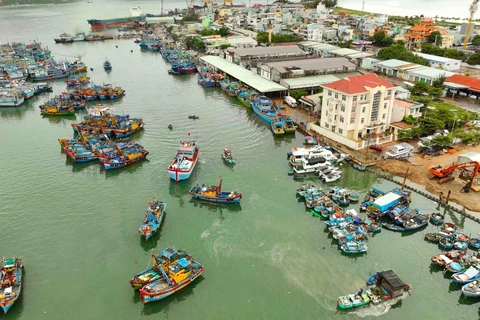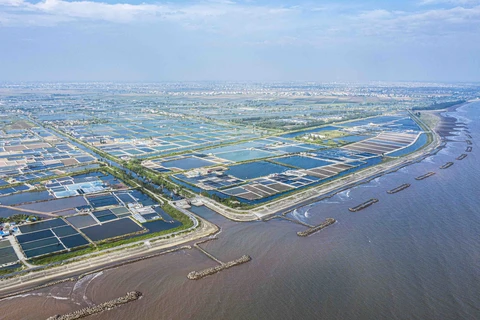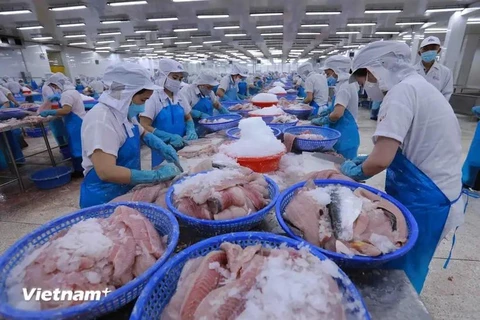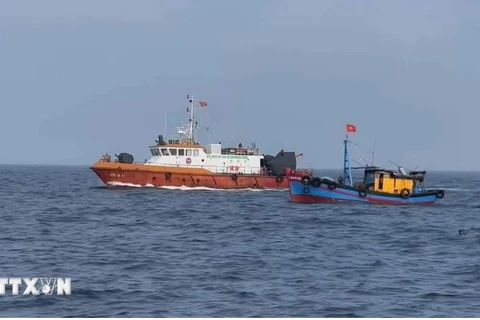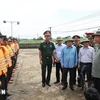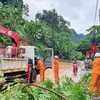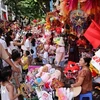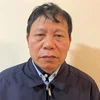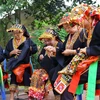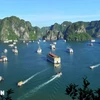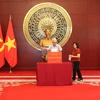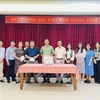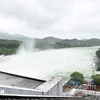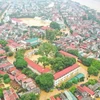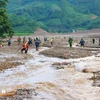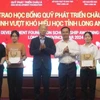Hanoi (VNA) - Vietnam has been working hard to realise the European Commission’s (EC) recommendations on combating illegal, unreported, and unregulated (IUU) fishing for the last seven years. During its on-site visits to Vietnam following the issuance of the “yellow card” warning in 2017, the EC delegation has recognised Vietnam’s positive progress in tackling IUU fishing.
The upcoming inspection by the EC scheduled for October 2024 is expected to present another opportunity for Vietnam to demonstrate its strong political commitment from the central to local levels and stringent measures against IUU fishing, according to experts.
James Borton, a non-resident senior fellow at Johns Hopkins SAIS Foreign Policy Institute told Vietnam News Agency that Vietnamese authorities have demonstrated an eagerness and willingness to strengthen its legal framework and improve traceability and transparency in seafood trade. “These commitments underscore the significance of collaborative engagement in addressing IUU fishing challenges,” he said.

Borton was of the view that IUU fishing continues to be a problem of the Vietnamese fishing industry that is a cornerstone of the country’s economy. “As a result, Vietnam has taken urgent steps to move towards greater marine stewardship since the South China Sea (called the East Sea in Vietnam) - one of the richest fishing grounds in the world - has suffered depletion of fish stocks.”
Since Vietnam is one of the major seafood exporters worldwide, authorities know that they must succeed in fortifying its legal framework and improve traceability and transparency, Borton added.
He noted that Vietnam has taken a number of measures to combat IUU fishing, including installation of monitoring systems aboard vessels, cooperation with other Southeast Asia countries and transnational organisations, and participation in the UN Fish Stocks Agreement and the Port Measures.
Certainly, there remains a significant need for improvement, particularly in enforcing regulations and regularly updating the database of licensed fishing vessels, Borton added.
According to Stephen Nagy, Director of Policy Studies for the Yokosuka Council of Asia-Pacific Studies (YCAPS), a key challenge in tackling IUU is that developing states have neither the advanced technology nor capacity to deal with violations. “That means the number of vessels necessary to monitor and enforce local and international law is limited.”

"What we see is ships that are engaged in these activities turn off their vessel monitoring system (VMS) devices, which is why we call them “dark vessels,” and they engage in mass illegal and unregulated, undocumented fishing. As long as this continues to be the case, it will be difficult to protect and sustain maritime resources for future generations," Nagy said.
Therefore, having access to technologies that can help identify dark vessels or those vessels that are engaged in IUU activities will be important. “That means countries like Vietnam need to look beyond their regional partners for technologies and for further assistance. For example, Canada has worked actively with the Philippines in terms of dark vessel technology, which allows the Filipinos to detect ships engaged in IUU fishing, thus contributing to their efforts to successfully remove the EC’s yellow card. This will be an area of future cooperation,” Nagy added.

Jean-Jacques Bouflet, EuroCham Vice-Chairman in charge of Advocacy, said Vietnam did make some significant progress lately in terms of reinforcing the legal framework and increasing attempts to achieve better enforcement. However, the “yellow card” issue still remains partially due to the lack of resources, personnel, and enforcement. The main issue lies with the vessel monitoring system (VMS) device, which requires measures to ensure that these devices are used effectively and consistently.
Sharing the same view, Nagy highlighted that many countries, including Vietnam and other Southeast Asian nations, face challenges in combating IUU fishing due to the lack of resources, maritime domain awareness, and the ability to enforce local and international law.
Therefore, it is necessary to increase awareness among fishermen and also seafood product buyers, experts said.
Rhea Moss-Christian, Executive Director of the Western and Central Pacific Fisheries Commission (WCPFC) said IUU fishing undermines the very foundation of sustainable fisheries management, threatening marine ecosystems and the livelihoods and food security of communities, particularly in small developing island states and participating territories in the Western Pacific Ocean.

In the WCPFC context, Vietnam is cooperating in and contributing to supporting the sustainable management of highly migratory fish stocks under the purview of the WCPFC Convention, through national and subregional cooperative activities in the Western Pacific and East Asia Seas.
Since 2009, Vietnam has been one of the three participating countries in the WCPFC’s Western Pacific East Asia Improved Tuna Monitoring (WPEA- ITM) Project, which has directly helped improve fisheries data collection and is addressing important data gaps in stock assessments for tropical tunas.
She went on to say that the WCPFC attended a Regional Workshop on Operationalising Cooperative Mechanisms to Combat IUU Fishing host by Vietnam in the central coastal city of Da Nang late April. The event saw the participation of international and regional experts in fisheries law enforcement from 12 countries, namely Australia, Canada, Indonesia, Japan, the Republic of Korea, Malaysia, the Philippines, Thailand, the UK, the US, and Vietnam.
Through that workshop, Vietnam informed the meeting of the national measures, including Port State activities, that are supporting efforts to combat IUU fishing in Western Pacific and East Asia Seas.
Anti-IUU fishing requires buy-in from all stakeholders
Rhea Moss-Christian underlined key factors that help countries combat IUU fishing effectively and ensure the protection and sustainable use of marine resources for future generations. They include whole-of-government coordination and data sharing; collaboration among national coast guard personnel, port inspectors and regional fisheries management organisations; and cooperation with neighbouring countries for sharing of the best practices on approaches to combat IUU fishing and exchanging information on maritime threats.
Drawing from its experience in implementing activities for improving monitoring, traceability and sustainability, EuroCham is willing to share, collaborate, and actively engage more with relevant parties such as the Vietnam Association of Seafood Exporters and Producers (VASEP) to ensure that “VASEP members when they buy fish product in Vietnam for re-exporting to Europe, they ensure themselves, also double check for the respect of the legislation,” according to Bouflet.
The upcoming Green Economic Forum and Exhibition (GEFE) hosted by EuroCham in October 2024 in Ho Chi Minh City also expects to welcome Vietnamese partners to engage in some exchanges on sustainability in the fishing industry.
Meanwhile, Borton suggested that Vietnam can take leadership once again in ASEAN by rallying support for the Regional Fisheries Management Organizations (RFMOs) and hosting or encouraging other neighbouring countries to stage workshops on best practices in fishing governance. “After all, all of the Southeast Asian countries have their nets in the water and all of them are dependent on the marine fisheries as their main source of revenue, employment and food security,” he said.
He added that the fisheries sector is of the highest priority for ASEAN economic integration. It is time to renew the emphasis and build on the progress, which has been so far limited, on the Strategic Plan of Action for ASEAN Cooperation on Fisheries 2021-2025, according to Borton.
“An anti-IUU fishing mandate requires buy-in from all fishermen, whether they be artisanal or commercial, coastal communities and the citizens at large,” Borton said./.
